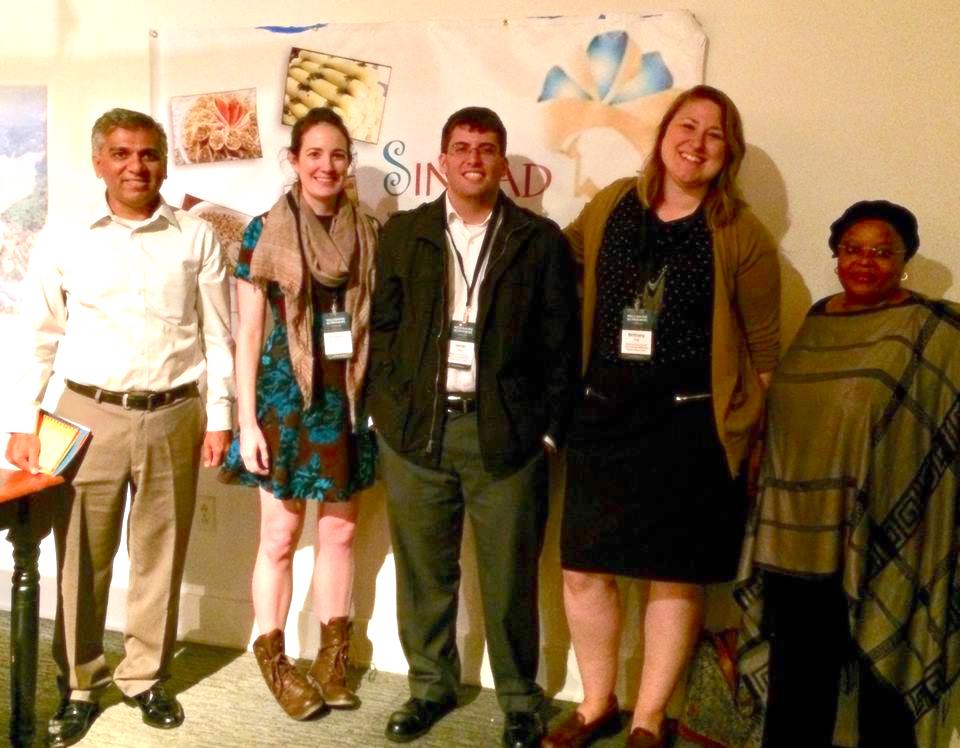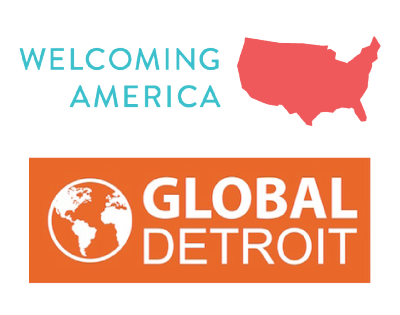From the Salt City to the Glass City: The birth of Toledo’s international student retention project at the 2017 Welcoming Economies Convening
By Brittany Burns, PROPEL

Toledo-Lucas County delegation (left to right): Paresh Dalwalla, Brittany Burns, Javier Salas, Brittany Ford, and Mojabeng Kamala.
Welcome Toledo-Lucas County (Welcome TLC), a Welcoming Economies (WE Global) Network member, launched in 2014 to build a welcoming and inclusive community for immigrants, refugees, and people of diverse cultures. I first connected to Welcome TLC when I was hired as an Americorps VISTA to launch PROPEL (Providing Real Opportunities by Partnering with Experienced Leaders), a career-focused mentoring program for young adults from Middle Eastern and South Asian backgrounds. So when Welcome TLC’s co-lead Brittany Ford invited me to join the Toledo delegation to the Welcoming Economies Convening last October, I jumped at the chance.
New to immigrant economic development, I was grateful for the opportunity to attend the Welcoming Economies 101 pre-Convening session. Welcoming Economies 101 was designed both for individuals and for delegations consisting of multiple participants from the same region to work through a series of questions designed to make the connection between immigrant inclusion and broader regional economic development strategies. Participants walked away with concrete action steps towards one objective to take home and develop strategic partnerships.
During the session, we reviewed three proven immigrant-focused economic development strategies: entrepreneurship, homeownership, and international student retention. Each delegation then chose a strategy and envisioned employing that strategy in our local context. I gravitated toward international student retention since several PROPEL mentees who are international students had shared with me their struggles to take advantage of the Optional Practical Training (OPT) and Curricular Practical Training (CPT) work authorization, and how those struggles made them more likely to leave the U.S. after graduation. Fortunately the rest of the Toledo/Lucas County delegation, which included several members interested in the career development of young people and students, gravitated right along with me.
The facilitators’ guidance and perspectives of our peers enabled us to push past sticking points that could have impeded us had our delegations been working separately (most of us have been in planning meetings where a discussion of administrative minutiae regarding a new project has totally overwhelmed attempts to define what that project will be!). Before we left the session, we had scribbled down ideas for stakeholders to bring on board, existing programs to connect with, and initial conversations to set up (some of which took place or were arranged before we even left the Syracuse Convening). We were then able to view the rest of the Welcoming Economies Convening not only through the lens of our existing work, but also with an eye toward this new endeavor.
For example, I was able to connect in person with Gracie Xavier, who directs the Global Talent Retention Initiative (GTRI) in Michigan, the first international student retention program in the country. GTRI, launched in 2013, went through a few iterations before becoming what it is today. From Gracie I gathered some preliminary insights that helped us get the wheels rolling on our project in Toledo. Furthermore, I developed a personal connection that will serve as an ongoing resource to answer the questions that will inevitably arise as we move the project forward.
I’m happy to say that in the three months since the Convening, we’ve continued to refine our ideas for a Toledo International Student Retention (ISR) project, utilizing the connections with organizations like Global Detroit that we made in Syracuse. We are collaborating with international student leaders and the University of Toledo’s international student department on a short, year-by-year guide for international students hoping to secure employment and remain in the US post-graduation. The idea for the guide came from a similar guide that the Washington University in St. Louis put together, which we were introduced to by the St. Louis Mosaic Project, yet another WE Global Network member.
While our team would have eventually reached this point on our own, zeroing in on how to make aparticular strategy work in our local context got us churning forward instantly. The opportunity for immediate and in-person connections with individuals that are doing similar projects provide guidance and lessons learned. That’s a powerful combination that made the Toledo ISR project move beyond the Convening and into “real life” back home.
The progress our team has made in just a few months highlights the value of the Network and its annual Convening. The welcoming movement has grown and expanded a lot in the last few years, and as we are all developing new and innovative strategies and programs in difference cities across the country, we benefit from not having to reinvent the wheel. Building our program on the shoulders of some of the trailblazers before us, and learning from their successes and failures, positions us to be more effective in our work, better serve the immigrants in our communities, and be more strategic in our goal of building inclusive and prosperous economies for all.
About the Welcoming Economies Convening:
The Welcoming Economies Global Network Convening is an annual regional gathering of cities and community leaders committed to welcoming, retaining, and empowering immigrants as valued contributors to our economies. The Welcoming Economies Convening is an opportunity to exchange and learn about the growing energy and momentum of local initiatives in the 10-state WE Global region (IL, IN, IA, MI, MN, MO, NY, OH, PA, WI), drawing on the lessons of the Rust Belt. Learn more.
Subscribe to our newsletter to receive the latest updates on the 2018 Convening.



